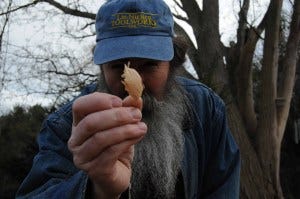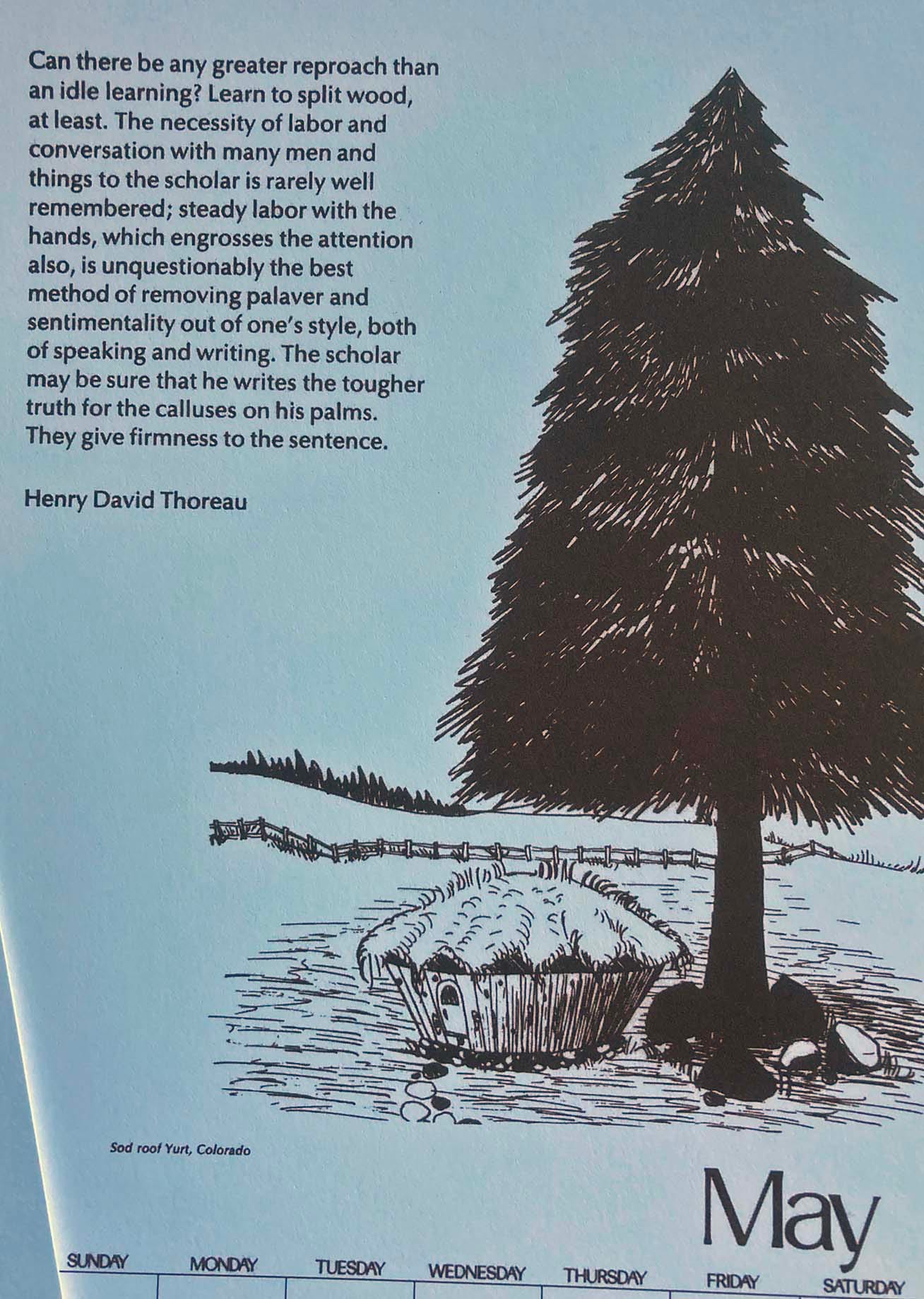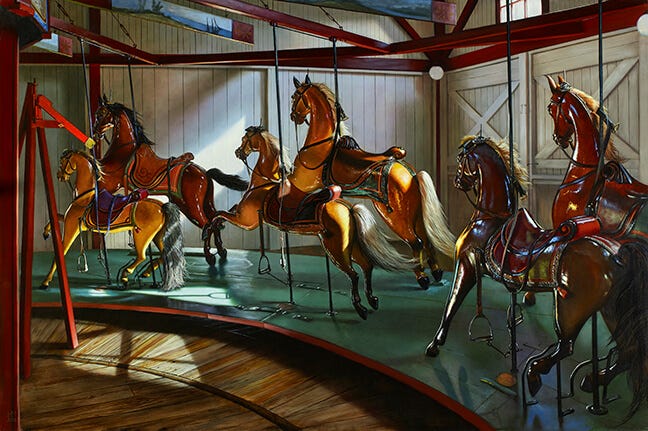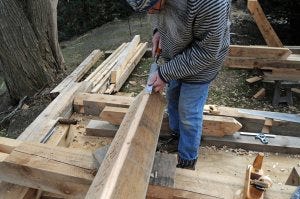[it’s pretty cold for here today, 10°F when I got up. Some days it’s too cold to bother lighting the stove in the shop - so I lose a couple of shop days each winter. Not a big deal. But I was thinking I’ll take care of a few things at my desk, then go out & split some wood later. One thing I did first was send off my check for the 2025 Bill Coperthwaite calendar https://www.insearchofsimplicity.net/dickinsons-reach-calendar.html - but while I wait for that one, I dug out one from 2014 - which is good for this year too. So one for the desk, one for the shop.
And as you see, that one has a Thoreau quote about how a writer benefits from splitting wood.
There’s lots of news these days about a new Dylan movie. Which made me think of this old blog post from 2016 - “There are no truths…” - so one last freebie-regurgitated post for the year. Thanks to all for coming along with me thus far. What follows was written July 27, 2016.]
Joshua Klein sent me a note, asking my take on his recent blog post about “real craft” and what that term means. http://mortiseandtenonmag.com/blogs/blog/thoughts-on-real-craft
The first half of his post follows the term, from Jarrod Stone Dahl, back to Robin Wood, who got onto it from an exhibition with that title by someone named Chris Eckersley. I won’t repeat all that here – it’s easy enough for you to read Klein, Stone Dahl & Wood to get the background. One thing I’ll start in with is that all three of these people are friends of mine…and I don’t usually get involved in this sort of stuff. But the heat has fried my brain, and I have a trip to prepare, so there’s stuff I’m avoiding.
Going back & reading Robin’s thoughts, his concentration is mostly about the use of machinery vs “hand” work. He chooses to skip past the “art vs craft” thing. Robin has spent a lot of time in recent years making spoon carving knives; so he knows the ins & outs of factory work…and has interesting thoughts on how work like that can be equally rewarding as handwork, as long as the machines do not take away the skill required by the workman.. I certainly won’t argue with the notions Robin puts forth. That sort of work holds no interest for me
The part I didn’t see discussed much is, if one thing is “real” craft, then something else must be “unreal” craft, or, perhaps, “fake” craft.
One thing Joshua cited was Eckersley stating that craft is “real” in the sense that it “occurs in the real everyday world, and not in a fine art studio, nor at a heritage site, nor as a hobby or pastime”. Well…that just hits me wrong. This week, we’ll have a short visit from our friend the painter Heather Neill as she comes north for her exhibition on Martha’s Vineyard. Why Eckersley thinks an artist’s (fine art) studio is not the “real everyday world” is not explained, at least in Joshua’s excerpt. Maybe it is in Eckersley’s exhibition. Heather works harder than me at her “craft” by a long shot. Her head is filled with decades’ worth of projects/paintings/ideas. And each year, she sits at her easel and produces astounding work. So because it’s what one curator once called “flat stuff” i.e. paintings, it’s not craft, it’s art. I guess. http://heatherneill.com/studio-blog/2016/07/18/granary-gallery-2016/
And “heritage sites” – I guess I worked for twenty years making furniture in one. It’s true that in that setting, I had the benefit of a regular paycheck that was not tied to my output. I had to be on the site, working, and explaining to the museum’s visitors what I was making. That kind of repetition and continuum gave me an experience it would be hard to replicate in Eckersley’s “real” world.
When I hear Jarrod talking about “real” craft on his blog or his Instagram postings, to me his use of the term sounds as if it is about marketing, I see him educating would-be customers about the quality and integrity of his work. (I’ve bought work from him, it’s good stuff.) And such a move makes perfect sense, Jarrod puts a lot of thought into marketing his work. I stink at marketing – it holds little interest for me.
http://woodspirithandcraft.com/
When Joshua picks up the thread and brings his views into it, all kinds of fun begins. He “state(s) the obvious: craft implies tradition.” His words, his emphasis. I don’t necessarily understand why or how that’s obvious. Nor do I think it’s true. To me, craft/crafted means made by someone – the action of someone making things. Pretty broad definition.
“Traditional” is one of those terms that means one thing to one person, something else to another. I make 17th-century style furniture, using only hand tools – but some of mine are now/have always been, more modern versions of period tools. I know I have used the term “traditional” before, I might still. But I’m nowadays pretty careful with the use of words like that – because of their shifting and varying meanings. Or perceived meanings.
The whole hand-tool versus machine debate is a large part of Joshua’s writings on the subject. Another thing I stay away from. I don’t want to work wood with machines. I am writing this blog post on a machine – and I like to do that…but for me personally, I like working wood with hand tools. That includes hewing, sawing, planing, mortising – all the stuff that happens in the shop. I have a neighbor who came by every so often while my friend Pret & I were framing the shop. He kept saying to me, in all seriousness, “I have a tablesaw you can borrow..” and I don’t-know-what-other tools he had. I started to wonder if he thought I didn’t know about these tools, or was somehow too broke to acquire them, or what he might have thought about why I wasn’t using them. He couldn’t fathom that I enjoyed doing it this way.
I don’t own a chainsaw, but I really like it when other people cut the logs I want to length with one. Then I can take it from there. I have cut trees by hand, and done the whole job – felling, crosscutting, splitting & hauling. I have also used a chainsaw at my old job. When they are right, they are a great tool. When they are cantankerous, they are a nuisance. To me, damned if you do, damned if you don’t. I don’t cut a lot of logs in a year. I have a 14’ oak, now all split into sections, that should carry me well into next winter now. So a couple times a year, I prevail on someone…then it’s quiet. Joshua discusses the approach that uses machinery to rough out the wood, then handtools to produce the final surface. A lot of people work that way, and it’s none of my business. What other people do is up to them. Means nothing to me.
[there’s lots of comments on Joshua’s post, including one from Jarrod about “continuum” – a nice take. Jarrod emphasizes utilitarian function – which some might hear the wrong way and think it excludes decoration. I know in Jarrod’s case that’s not true, (I’m expecting delivery any day now of one of his birch cannisters, decorated with punches and pigments). When reading about furniture, I am always keeping my ears up for the “utilitarian = no decoration” crowd!]
I keep going back to what is un-real craft? I thought of a much-hated example, cute little paintings on old handsaws. What could be worse? Lots of things, but it’s a pretty bad example that will do for now. So one thought is that my hand-made, museum-quality reproduction furniture is “real” craft, and the painted handsaw is unreal craft. My outlook on these things is a bit different. I don’t care what other people do. It could be that the handsaw-painting artisan is achieving a near blissful state of Buddha-hood while engrossed in their work for all I know. In which case, who am I to say my work is real and theirs is not? To me it’s about the process, and more importantly, about how I want to spend my days. Which brings me back to Henry David Thoreau by way of Bob Dylan.
I’ve told this story many times, but here goes again. Once, back at my old job, I had a young kid, maybe 10 years old, come into my shop and ask me “Do you have anything here that’s 3D?” The room was crammed with piles of wood, tools, furniture in various stages of completion. As far as I could tell, everything in the room was three-dimensional. I told him I didn’t quite understand, and asked if he could ask his question another way. “You know, it looks really real” he said. Which took me back to the existential days of the ‘60s – when Dylan sang “the princess and the prince discuss what’s real and what is not…” (I didn’t get to it til the 70s, but no matter). So I was thinking the other day about what’s real and what is not, and I pulled up Bringing It All Back Home, and listened – and heard another line from the Gates of Eden – “I try to harmonize with songs the lonesome sparrow sings…”
Dylan’s line about harmonizing reminded me of this section seen on the blog before (when discussing Jarrod, interestingly) from Thoreau.
“One-eyed John Goodwin, the fisherman, was loading into a hand-cart and conveying home the piles of driftwood which of late he had collected with his boat. It was a beautiful evening, and a clear amber sunset lit up all the eastern shores; and that man’s employment, so simple and direct, – though he is regarded by most as a vicious character, – whose whole motive was so easy to fathom, – thus to obtain his winter’s wood, – charmed me unspeakably. So much do we love actions that are simple. They are all so poetic. We, too, would fain be so employed. So unlike the pursuits of most men, so artificial or complicated. Consider how the broker collects his winter’s wood, what sport he make of it, what is his boat and hand-cart! Postponing instant life, he makes haste to Boston in the cars, and there deals in stocks, not quite relishing his employment, – and so earns the money with which he buys his fuel. And when by chance, I meet him about this indirect and complicated business, I am not struck with the beauty of his employment. It does not harmonize with the amber sunset.”
I’ll take either one, the sparrow’ song, or the amber sunset. I don’t care what people call my craft, or theirs. What I care about is how I spend my days. I try to harmonize…












“They deem me mad because I will not sell my days for gold; and I deem them mad because they think my days have a price.”
Khalil Gibran
Beautiful